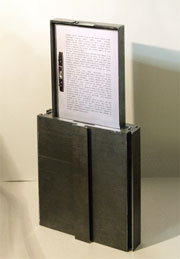Neopoetics or Architecture as an eidetic event
The theoretic presentations and the relevant experimental project will be relying on the following conclusions.
-
Poetics (the contemporary theory of Literature and Philosophy) has a conceptual system about the constructability of works of art which is open and ambiguous and which incorporates mental procedures and aesthetics.
-
“New technologies” have constructability through software, but without an intellectual content, so far.
-
Architecture and the city have great intellectual and material constructability and in the past few years they have been using “new technologies” but without any theoretical support.
-
Architecture and the city could use the conceptual system of poetics to combine points 1,2,3 with a contemporary theory ( that of eidetic event, Neopoetics)
-
However, architecture of the genealogy of poetics (Aristotle’s poetics) is cut off from poetic theory.
-
These presentations and the experimental project aim at bringing through art the contemporary poetic theory (in philosophy and literature) into contact with architecture, the city and new technologies within the framework of European tradition.
History-theory and conceptual design Workshop
Professor Filippos Oreopoulos
The control room and the store room
The theory of architecture is presented simultaneously with research areas that deal with literature and philosophy. In these areas, literature and philosophy display direct connections to space or have used such connections as exemplary validation data. At the same time, readings are organised concerning the rhetoric of contemporary architecture which quite often ends up criticizing the very idea of habitation. Nomadicity, instability, plasticity and the lack of foundations are frequently praised while at the same time architecture continues to serve consolidation, stability, friendly living, and installation. Keeping track of this ambiguity resembles a convention of modern thinking that denies expression while at the same time it clearly expresses its faith in the absence of any faith.
In light of these observations which have already formed a certain research sequence, this seminar enters into specific areas which are believed to express the most stable materials of architecture today: these areas on which we will focus our attention are the cabin and the store room. The cabin as a personal control room is presented alongside its history which coincides with important international moments. Working on cabins we examine airplane and spacecraft cockpits but we also look at the evolution of the control room and its modern restrictions imposed by the web-connected computer or VOIP telephony. With the study of the evolution of store rooms, we simultaneously examine the background of modern control rooms. Store rooms are classification areas which increasingly remind us of old libraries as they are organised according to a system which puts everything into order. They contain material goods but have been constructed to contain “knowledge”, and we search through them by using more or less refined search mechanisms.
In this postgraduate theoretical workshop, we examine the cabin and the store room in specific architectural cases. We use texts by Foucault, Deleuze, Derrida, Badiou, Klossowski, Bataille, Agamben and at the same time look at buildings by Buckminster Fuller, Konstantinos Doxiadis, Takis Zenetos, Francois Roche and other texts by Chesterton, Proust, Stevenson and Pynchon.
Aristeidis Antonakakis
Assistant Professor
